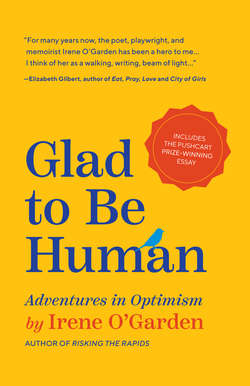Читать книгу Glad to Be Human - Irene O'Garden - Страница 15
На сайте Литреса книга снята с продажи.
ОглавлениеA Question of Gladness
Why is it even important to be glad to be human? We may be the only species that questions gladness.
This fuchsia-tinted Alstroemeria at my side has no second thoughts about gladly and extravagantly expressing herself.
If cells weren’t glad to be cells, could they metabolize? Could they have the little cellular barnraisings that lead to the creation of petals or peanuts or pineal glands?
If atoms were ashamed of being atoms, could they even join atomic hands to make a cell for a while? They’d skip the dance and stay home. No whirling around tonight, honey. I’m just not up to making a cell. Why bother anyway? I’m not that great at doing it, and after all, cells only die, so why even make one?
Humans cannot comprehend the larger body we compose, though we can feel its organs in a symphony orchestra, a sports team, a school, a hospital, a movie set. These larger selves need us to function just as we need the beings who compose our bodies. There is great joy when these larger bodies function well, because functioning well is the nature of Nature. Of course, any cell, plant or animal will tell you the purpose of life is not function, but joy. Just ask my flamboyant Alstroemeria.
This coursing sense of connected well-being, or gladness, is the default setting of each living creature, and doubtless, the inanimates as well. (If it’s all spinning particles, is anything really inanimate?) The holographic fractal beauty of physical reality is that gladness is important to each, and each is important to all.
